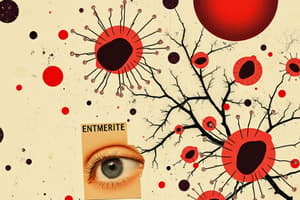Podcast
Questions and Answers
What type of immune response is primarily associated with B lymphocytes?
What type of immune response is primarily associated with B lymphocytes?
- Inflammatory response
- Humoral response (correct)
- Cell-mediated response
- Innate response
Which cells are formed from the remaining clone cells after the activation of B lymphocytes?
Which cells are formed from the remaining clone cells after the activation of B lymphocytes?
- Memory cells (correct)
- Plasma cells
- Natural killer cells
- Effector T cells
Where do T lymphocytes mature?
Where do T lymphocytes mature?
- Lymph nodes
- Spleen
- Thymus (correct)
- Red bone marrow
What is the primary target for B lymphocytes?
What is the primary target for B lymphocytes?
What is the function of plasma cells after the activation of B lymphocytes?
What is the function of plasma cells after the activation of B lymphocytes?
Which of the following statements about B and T lymphocytes is correct?
Which of the following statements about B and T lymphocytes is correct?
What is the primary role of Helper T cells?
What is the primary role of Helper T cells?
What happens to plasma cells after they secrete antibodies for 4 to 5 days?
What happens to plasma cells after they secrete antibodies for 4 to 5 days?
What is the structural form of IgA in plasma?
What is the structural form of IgA in plasma?
Which of the following accurately describes the existence of monomers in plasma?
Which of the following accurately describes the existence of monomers in plasma?
In what form does IgA primarily function within the immune response?
In what form does IgA primarily function within the immune response?
Which class of immunoglobulin is described as potentially existing as a monomer?
Which class of immunoglobulin is described as potentially existing as a monomer?
What is one key characteristic of IgA molecules?
What is one key characteristic of IgA molecules?
Which of the following statements regarding IgA is true?
Which of the following statements regarding IgA is true?
What are the functional implications of IgA's dimeric form?
What are the functional implications of IgA's dimeric form?
Given its characteristics, what is a notable limitation of monomers in plasma?
Given its characteristics, what is a notable limitation of monomers in plasma?
What is the primary role of antigen-presenting cells (APCs) when displaying a foreign antigen?
What is the primary role of antigen-presenting cells (APCs) when displaying a foreign antigen?
When a cell that is not an APC is invaded or cancerous, what message does it send?
When a cell that is not an APC is invaded or cancerous, what message does it send?
Which of the following statements is true regarding dendritic cells?
Which of the following statements is true regarding dendritic cells?
What message do cells that are recognized as self typically send?
What message do cells that are recognized as self typically send?
What is a key function of MHC molecules when presenting antigens?
What is a key function of MHC molecules when presenting antigens?
What might trigger a cell to send a 'kill me' signal?
What might trigger a cell to send a 'kill me' signal?
How do APCs contribute to the immune response?
How do APCs contribute to the immune response?
What do APCs use to convey their messages regarding foreign invaders?
What do APCs use to convey their messages regarding foreign invaders?
What is the primary role of antigens in the immune response?
What is the primary role of antigens in the immune response?
Which of the following best describes self-antigens?
Which of the following best describes self-antigens?
What is the role of antigen-presenting cells (APCs) in the adaptive immune response?
What is the role of antigen-presenting cells (APCs) in the adaptive immune response?
Which type of immunity is provided by B lymphocytes?
Which type of immunity is provided by B lymphocytes?
What distinguishes antigens from self-antigens?
What distinguishes antigens from self-antigens?
Which component is essential for T lymphocytes to bind antigens?
Which component is essential for T lymphocytes to bind antigens?
What is an antigenic determinant also known as?
What is an antigenic determinant also known as?
What is a key characteristic of most antigens?
What is a key characteristic of most antigens?
Which immunoglobulin class is primarily produced by plasma cells during the primary immune response?
Which immunoglobulin class is primarily produced by plasma cells during the primary immune response?
What role does the presence of IgM play in diagnostics?
What role does the presence of IgM play in diagnostics?
Which cell type is responsible for producing IgM during the immune response?
Which cell type is responsible for producing IgM during the immune response?
What is the significance of IgM in the immune response?
What is the significance of IgM in the immune response?
What occurrence is most likely indicated by high levels of IgM in a patient?
What occurrence is most likely indicated by high levels of IgM in a patient?
During which phase of the immune response is IgM primarily generated?
During which phase of the immune response is IgM primarily generated?
What does a high presence of IgM suggest about the patient's immune status?
What does a high presence of IgM suggest about the patient's immune status?
Which of the following is NOT a characteristic of IgM?
Which of the following is NOT a characteristic of IgM?
Which type of immunoglobulin indicates serological response to acute infection?
Which type of immunoglobulin indicates serological response to acute infection?
Why is the presence of IgM often diagnostic in clinical settings?
Why is the presence of IgM often diagnostic in clinical settings?
Flashcards are hidden until you start studying
Study Notes
Overview of B and T Lymphocytes
- B lymphocytes are part of the humoral immune response; T lymphocytes are involved in the cellular immune response.
- B cells secrete antibodies, while T cells do not secrete antibodies.
- B lymphocytes primarily target extracellular pathogens; T lymphocytes target intracellular pathogens and cancer cells.
- Both types of lymphocytes originate in the red bone marrow; B cells mature there, while T cells mature in the thymus.
- Effector B cells become plasma cells; T cells differentiate into cytotoxic T cells, helper T cells, and regulatory T cells.
- Both B and T lymphocytes form memory cells, aiding in quicker responses to subsequent exposures.
Activation and Differentiation of B Cells
- Naive B cells activate upon antigen binding through clonal selection, leading to proliferation and differentiation.
- Most activated B cells become plasma cells, secreting approximately 2000 antibodies per second for 4 to 5 days.
- Plasma cell antibodies are identical to the antigen receptors on the parent B cells.
- Some B cells become memory cells, facilitating a rapid response upon future encounters with the same antigen.
Antigens and Immune Response
- Antigens are substances that trigger adaptive immune responses, acting as targets for these defenses.
- Most antigens are large, complex molecules that are foreign to the body, recognized as nonself by the immune system.
- Many antigens contain multiple antigenic determinants, known as epitopes, which provoke immune responses.
Self-Antigens and MHC Proteins
- Self-antigens are proteins on body cell surfaces that are usually non-antigenic to the individual but may provoke responses in others.
- Major histocompatibility complex (MHC) proteins are a type of self-antigen unique to each person and play a key role in immune recognition.
- T lymphocytes require antigens to be presented on MHC proteins for binding and activation.
Cells of the Adaptive Immune Response
- The adaptive immune system comprises two main lymphocyte populations (B and T cells) and antigen-presenting cells (APCs).
- B lymphocytes provide humoral immunity, while T lymphocytes deliver cellular immunity.
- APCs present antigens to T cells, playing essential auxiliary roles in the immune response.
Lymphocyte Development, Maturation, and Activation
- Lymphocyte development occurs in the red bone marrow for both B and T cells, followed by maturation in respective sites (B cells in bone marrow, T cells in thymus).
- Activation of B and T cells leads to differentiation, forming effector cells that execute immune responses.
- Immunoglobulin classes formed during primary responses, such as IgM, are critical indicators of current infections due to specific antibody formation patterns.
Studying That Suits You
Use AI to generate personalized quizzes and flashcards to suit your learning preferences.




